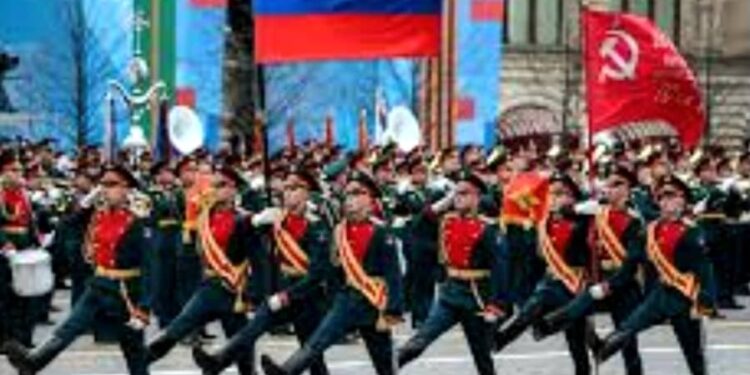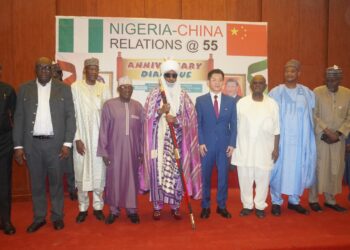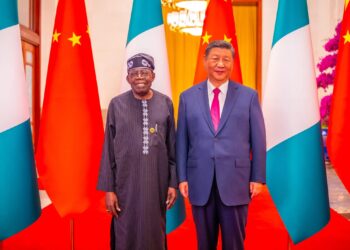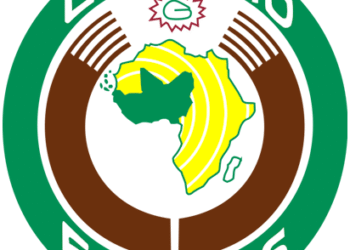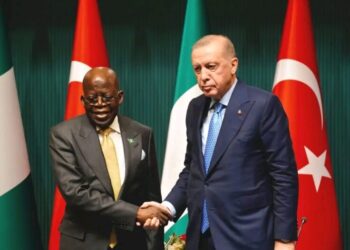UNDERSTANDING RUSSIA’S GREAT PATRIOTIC WAR AND VICTORY
By Lawal Sale
BACKGROUND :
It has been 80 years since the forces of the Red Army of the Union of Soviet Socialist Republics (USSR) courageously stopped the Nazi German Army from annihilating the Soviet Union.
Although, the declaration of victory on the early hours of May 9, 1945 by the Soviet Red Army over the Nazi marauders came at a terrifying cost; it, nonetheless, demonstrated the unyielding strength, courage and patriotic will of a people who bore the main burden of the World War 2 and the defeat of the Nazi Germany.
This final chapter of the Great Patriotic War climaxed in the Battle of Berlin, following a massive and brutal operation that sealed the fate of the Nazi invaders.
The attack on Soviet Union started in the early hours of June 22, 1941 following the refusal of the Nazi Germany to adhere to the previous non-aggressive pact between the two countries.
This non-compliance with the pact marked the beginning of Operation Barbarossa, the largest military invasion in human history and the escalation of World War 2.
The Soviet Union then comprised of not only Russia but also Belarus, Ukraine, Estonia and 12 other Soviet Republics that fought together and lost about 27 million people in what is known today as “Great Patriotic War” in Russia.
It is worthy to note that in spite of the involvement of the Allied Forces (the U.S., U.K and France, among others), the Soviet Union recorded more casualties than any other country during the war which lasted between June 1941 and May 1945.
According to Sergy, son of a veteran of the war, the Russians will remember the heroism of the Red Army, which liberated countless prisoners of war and ultimately raised the flag of victory over Berlin.
He emphasized that the valiant efforts of the Allied Forces that fought shoulder-to-shoulder against a common evil could not be easily forgotten, adding that the collective sacrifice liberated the world from the tyranny of Nazism, as every family in the former Soviet Union was touched by the tragedy in those four gruesome years.
THE BATTLES
Operation Barbarossa:
This operation was the beginning of the invasion of the Soviet Union on 22nd June, 1941. More than 3.5 Wehrmacht troops invaded the western Soviet Union along the 2,900-kilometre front, with the main goal of capturing Soviet territory known as the A-A line.
During the first week of the war, the Soviet Red Army suffered enormous losses; perhaps due to its unpreparedness for the surprise attack. However, the unprecedented courage and heroism demonstrated by Soviet soldiers and civilians, allowed the nation to withstand the initial onslaught and organise pragmatic resistance, setting the platform for a long and gruelling battle ahead.
Battle of Moscow:
Between October 1941 and April 1942, German troops reached the outskirts of Moscow, coming as close as 20-30 kilometres to the Soviet capital.
In that battle, the Soviet soldiers displayed remarkable resilience and heroism, alongside the mobilisation of the entire civilian population and timely reinforcement from Siberia; they managed to halt the enemy’s advancement.
The defence of Moscow was the first major defeat for Nazi Germany during the war.
Siege of Leningrad:
The siege of Leningrad lasted 872 days, making it one of the most tragic chapters in world history. Over one million civilians perished due to extreme hunger, freezing cold and constant artillery bombardments.
The renowned “Road of Life”, which was established across the frozen Lake Ladoga, was the only lifeline.
The frozen lake allowed the delivery of desperately needed food and supplies, while facilitating the evacuation of residents to safety.
Battle of Stalingrad (July 1942 to February 1943):
This battle was one of the longest, bloodiest and most decisive battles of the Great Patriotic War, symbolising both the profound tragedy and unparalleled heroism of Soviet people.
Operation Uranus, a strategic operation successfully encircled approximately 300,000 German troops of the 6th Army under General Friedrich Paulus. Due to starvation and bitter winter conditions, the German forces eventually capitulated and surrendered to the Soviet Red Army in February 1943.
Battle of Kursk:
This battle was the largest tank engagement in the history of warfare and a pivotal moment in the Great Patriotic War. More than 2 million soldiers, 6,000 tanks, and 4,000 aircraft from both sides clashed in what would end in a decisive Soviet victory.
The Red Army, not only halted the German advance but also launched counter-offensive campaigns – Operations Kutuzov and Rumyantsev – pushing the enemy back and liberating vast territories; marking the final loss of strategic initiative for Nazi Germany on the Eastern front.
Liberation of Europe:
Beginning from 1944, the Soviet Red Army launched a series of powerful offensives which resulted in the liberation of Eastern and Central Europe from Nazi occupation.
One of the notable operations was Operation Bagration, during which the Red Army decisively crushed the German Army and liberated over 120,000 square kilometres of Soviet territory.
Subsequent operations also led to the liberation of Poland, Romania, Hungary, Bulgaria, Czechoslovakia and Yugoslavia.
Capture of Berlin:
The final chapter of the Great Patriotic War was between April and May 1945 in the Battle of Berlin. It was a massive and brutal operation that finally sealed the fate of Nazi Germany.
The Red Army, comprising over 2.5 million soldiers, 6,250 tanks, and 7,500 aircraft, launched the assault on April 16, 1945; breaking through the heavily fortified German defensive lines along the Oder River.
As fighting raged, the celebrated heart of the Third Reich was reduced to rubble. On April 30, 1945, Soviet troops stormed the Reichstag and triumphantly raised the victory banner – a symbol of the Soviet people’s triumph over fascism.
There is no dispute to the fact that Germany signed the instrument of surrender on the night of May 8, 1945 in Berlin, and that was a most defining moment of World War II. It ended Adolf Hitler’s advance in his vision of total conquest of the entire Europe.
LEGACY OF VICTORY
After the capture of Berlin, the phase of victory was set. It was a feeling of great sacrifice by Soviet/Russians after the war.
Victory Day was first celebrated on May 9, 1945 with a massively expressive military parade at the Red Square in Moscow. The parade was commanded by Georgy Zhukov, one of the Russia’s/Soviet greatest military leaders, who was elevated to the rank of Marshal in January 1943 in recognition of his exceptional leadership and military prowess.
The commemoration of the Victory Day against the Nazi Germany became an utmost priority for Russians as a result of the May 1945 unconditional surrender of the Nazi Germany.
In fact, the captured German insignia was featured during the first Victory Day celebration.
Indeed, Soviet/Russia’s Red Army was the main tool for Nazism’s destruction. The Soviet Union paid the harshest and immeasurable price for the victory over the fascists.
More than 27 million Soviet/Russian lives, including soldiers, partisans, and prisoners of war, as well as countless civilian men, women and children, were lost in the war.
In addition, the Soviet Union suffered colossal destruction, as over 1,700 towns and 70,000 villages, as well as thousands of factories, schools, and hospitals were either razed or completely destroyed.
There is no gainsaying the fact that the victory in the Great Patriotic War became a defining moment in Russian and world history; an eternal symbol of sacrifice, resilience and unity in the face of inhuman brutality.
It is a legacy that lives on not only in monuments and commiserations, but it is also the very foundation of modern peace.
MOMENT OF TRUTH
As Russia celebrates 80 years since its triumphant victory over Adolf Hitler’s Nazi Germany in coming days, the importance of preserving historical truth has been more evident.
The Russian Federation has consistently stood against any and all attempts to whitewash Nazism.
Every year, Russia introduces resolutions at the United Nations, urging nations to combat the glorification of Nazism and neo-fascist ideologies — a call that stems from the blood-soaked lessons of history and the responsibility to those who perished.
Meanwhile, the Russian Ambassador to Nigeria, Andrey Podylshev, has conveyed Russia’s gratitude to all countries, including Nigeria, which have been supporting these initiatives and standing with Russia on the side of the truth and justice.
Amb. Podylshev made this remarks during a photo exhibition organized by the Embassy in Abuja to commemorate of the 80th Victory Day Anniversary.
Besides, Podylshev noted that it was heartening to remember that Africans also fought against fascism decades ago, adding that today, African nations had continued to value the ideals of anti-colonialism, anti-racism and human dignity, which were incompatible with any veneration of Nazism.
*Sale is an Abuja-based Global South Affairs Analyst (lawalmaida1@yahoo.com)*
(vitalnewsngr.com)


